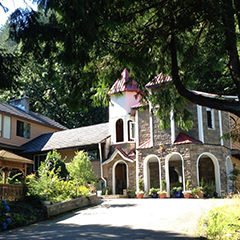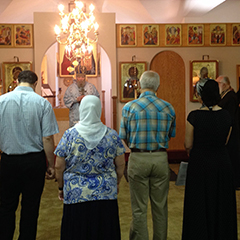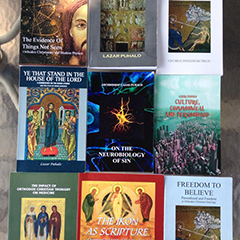
During our travels through southern BC, I was able to drop in to the Monastery of All Saints in Dewdney. The monastery has three residents and is presided over by Most Reverend Lazar Puhalo (Vladika), a retired archbishop (his biography is quite fascinating). I have been watching his YouTube videos for 3 or 4 years now, off and on. He is a polarizing figure in the Orthodox community, but I find the depth and breadth of his knowledge to be a great source of wisdom.
We stopped in one Sunday afternoon just as people were clearing out after a potluck. Since we were driving through the area, I thought I would pop in and shake his hand, thank him for his ministry and leave. I ended up having an almost 2 hour visit with Vladika over coffee and cakes. My wife and kids were welcomed graciously and they visited with Bishop Varlaam, a very kind and attentive man. My family also strolled the gardens and watched ducks on the pond.
My conversation with Bishop Puhalo wound through many topics. I explained where I was in my journey and how I am fascinated with the Orthodox Church and its theology and practice and that I am deeply connected to my protestant church and protestant church school. My greatest regret is that I didn't anticipate having his ear and therefore I did not have any really good questions to ask of him. If I did have the time and forethought, this is what I would have brought to the conversation:
Why is there not a more formal pronouncement from the Eastern Orthodox Church acknowledging the validity of the Protestant concerns regarding things like decentralized power among the clergy, separation of church and state, and church abuses of power?
Notwithstanding the offences in western countries despite western church presence there, why have we seen such devastation in traditionally Eastern Orthodox countries - Serbia, Russia, Ukraine, Greece, Romania, etc.? In other words, has the church not had the influence in its population that it ought to as far as transforming hearts and culture? Why has the church lost its influence/relevance?
How does a protestant (like me) incorporate orthodox practices into his life without become an orthodox christian? Everything is so foreign (sometimes literally in foreign languages) and inaccessible.

The following week, I was back in the area and I attended a Sunday morning service. I was one of 4 attendees of matins (or "the hours"), the preliminary 1 hour service. Everyone except for the elderly or young mothers stands for the whole service (which, including matins, lasted nearly 3 hours). Bishop Varlaam welcomed me and got me situated with a copy of the liturgy. A married couple sang back and forth through the liturgy which consisted of many Psalms which are organized to retell the whole story of redemption from Creation to Fall to Resurrection to Glory.
The main service continued the liturgy of St. John Chrysostom and includes many rites and congregational responses that I mostly did not understand. Archbishop Puhalo spoke for about 15 minutes for the homily. I didn't partake in the eucharist as I am neither a member nor did I fast ahead of time.
What was of incredible impact to me was that the whole liturgy is sung - this is a visceral experience where your entire body begins to resonate with the truths you sing and intone. Not only is the music of salvation ringing throughout the room, but your sight is stimulated by the dozens of ikons on the walls, your nose is filled with incense, your mouth takes in salvation if you are partaking in the eucharist and wine, and your flesh contacts holy objects as you enter the room and kiss ikons and crosses and the Holy Bible. It is a time that affirms the importance of the physical realm while infusing it with spiritual truth. This sensory worship is in stark contrast to the strictly intellectual and emotional services in the protestant world.

Upon my first visit at the monastery, Archbishop Lazar blessed me with several books from the monastery's printing press, Synaxis. The books are very scholarly and grounded in quotes from early church fathers. I am excited to read through these as I have read a few of Lazar's books in the past and they have been very helpful.




























